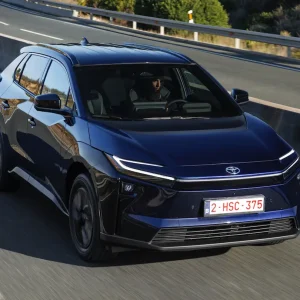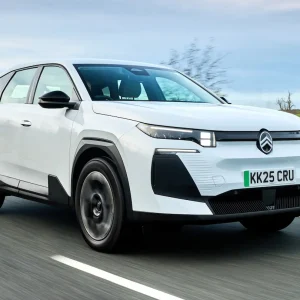The original ID.3 launched back in 2020 was pivotal, in our opinion, in the move to electrification – with more than 600,000 sold worldwide to date, according to Volkswagen.
The first of Volkswagen Group’s passenger cars to be built on the Modular Electric Drive (MEB) platform might have many fans, but still attracted criticism for its interior quality, which didn’t really feel in line with the badge. Then, there’s the roundly disliked infotainment, which is difficult to use.
The good news is that Volkswagen has worked hard to give a quality feel to this facelifted version. So, this ID.3 now has soft touch materials for the door trims and the lower half of the dashboard with its CNC seams in a contrasting colour. The seats also get new covers, which along with the door cards, are made from a 71% recyclate, called ArtVelours Eco.
Elsewhere, Volkswagen listened to customer suggestions about other interior improvements. These include remodelled doors that now have softer, larger surfaces with more generous hand rests.
Sadly, the biggest frustration in this Volkswagen EV’s interior – the infotainment and sat-nav – remain unchanged. A larger touchscreen and back-lit temperature sliders are due, but we will have to wait until next year for these upgrades. Instead, what we do get is an upgrade to Volkswagen’s 3.5 software version, plus improved connectivity and features. However, the operating and technical issues remain – although we were promised that owners will receive continuous improvements to this system via over-the-air updates.
Elsewhere inside, the ID.3 remains the spacious EV hatch it’s always been – with a 385-litre boot with the seats up, or 1,267 litres with the rear seat backrests folded.
Outside, Volkswagen has ditched the large black plastic strip on the far edge of the bonnet and redesigned it. It is surprising how much this changes the look of the ID.3 from the front and side – making it far smoother and seem longer. The ID.3 also gets a revised front bumper with larger front air intakes, smoothing out the airflow around the car. There are also new front and rear lights, with the rear lights now having a striking light signature. Finally, there are new body colours that contrast with the black painted roof.
There are two battery variants and two equipment grades to choose from (Pro and Pro S). The ID.3 is offered with the choice of a 201hp 58kWh model, with 266 miles range on the WLTP cycle, or the same motor with a 77kWh battery, that gives the ID.3 Pro S a range of up to 347 WLTP miles.
The 58kWh version hits 62mph in 7.4 seconds, with the 77kWh version taking slightly longer at 7.9 seconds. The 58kWh version that we drove didn’t feel slow.
‘We Charge’ is Volkswagen’s ecosystem for convenient, connected and sustainable charging. It offers the ideal solution for anything from long drives to short trips or charging at home. At a quick-charging station, the ID.3 Pro S can be charged from five to 80% in 30 minutes, with a charging capacity of up to 170kW. The ID.3 Pro needs 35 minutes to cover the same charge, with a charging capacity of up to 120kW.
On the road, this car drives in much the same way as the original ID.3. So, think tidy but uninvolved, with you sometimes wishing for a more dynamic set-up like its sister car, the Cupra Born. Although fitted with modest 18in wheels, the ride is harder than expected. The brakes too could still do with more feel and modulation.
So to sum up, the updated ID.3 feels like a halfway house. The changes, where made, are well executed and it’s good to drive. But a cloud still hangs over the infotainment and the Born looks and feels more exciting.
Volkswagen ID.3 Pro 58kWh
P11D: £37,060
Residual value: TBC
Depreciation: TBC
Fuel: TBC
Service, maintenance and repair: TBC
Cost per mile: TBC
Range: 266 miles
CO2 (BIK %): 0g/km (2%)
BIK 20/40% a month: £12/£25
Luggage capacity: 385 litres
Battery size/power: 58kWh/201hp





